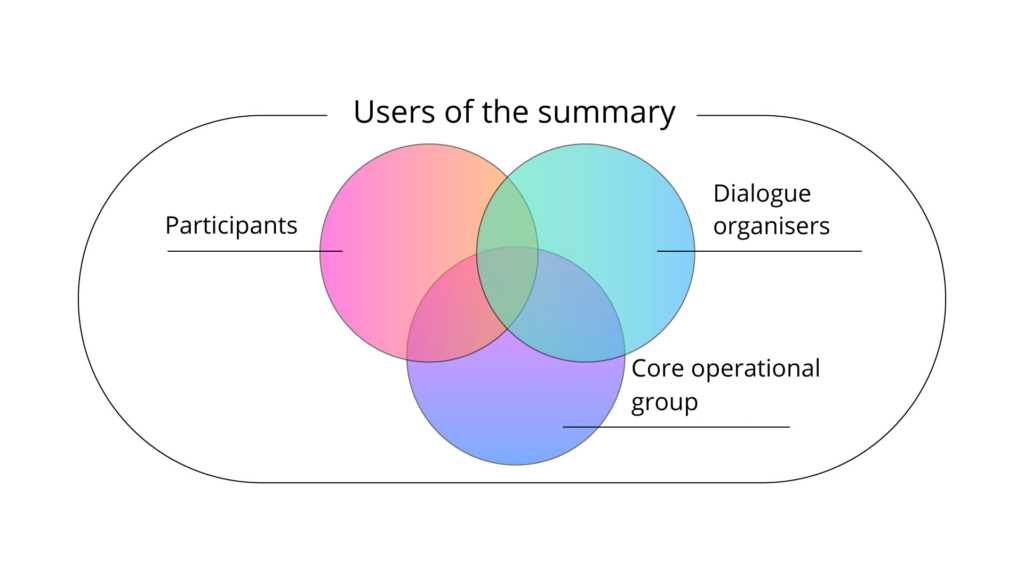

The key actors in the National Dialogues are the participants and the organisers of the dialogues. To enable the dialogues and their effectiveness, an operative core group is needed to take care of the background arrangements and, amongst other things, to draw up the national summary. The users of the summary are also important for impact.
There are three types of organisers: permanent dialogue organisers, organisers based on the topic and those participating based on an open invitation
The operative core group will ensure that the dialogue organisers form from a broad range of stakeholders and the specific dialogue subjects cover regional and group-specific issues. The topics should be widely from multiple perspectives.
The aim of the National Dialogues is for the dialogue organiser’s own activities or organisation to gain a deeper understanding. It is hoped that the dialogue organisers will gain an experience of being part of a socially significant entity.
The aim is to establish permanent dialogue organisers for the entire country as well as actors that reach different groups of people as extensively as possible. All those who wish to fulfil the criteria will be appointed as the permanent dialogue organiser, and they will become a network. The network is maintained by an operational core group.
The National Dialogues are held twice a year, once in the spring and once in the autumn. In spring or autumn, there are two to four dialogue days, of which at least two permanent dialogue organisers must organise a dialogue. You can act as a permanent dialogue organiser for as long as you agree to organise at least two dialogues per year. This will ensure that the regular dialogue organisers are active participants.
The permanent dialogue organiser must have prior experience of organising and guiding the dialogue. The organiser of the dialogue has participated in the Lockdown Dialogues, Democracy Defence Dialogues, Immigration Dialogues or otherwise organised and steered dialogues.
The permanent dialogue organisers will have the opportunity to influence the selection of the theme of National Dialogues and be invited to join the peer network.
The Ministry of Finance is responsible for co-ordinating peer-to-peer activities of the permanent dialogue organisers. The aim is to form a network that provides mutual support for each other meeting a few times a year. The activities of the peer network are planned together with the regular dialogue organisers according to the needs arising from the network.
It is also hoped that permanent dialogue organisers will share information about National Dialogues and become a dialogue organiser.
The core group charts and invites the dialogue organisers in accordance with the topic. The aim is to get different groups to discuss the selected subject of the National Dialogue as comprehensively as possible and to find actors from different target groups to act as the organiser of the dialogue. Organisers based on the theme will be sought and attracted separately for each round.
Any organisation or organisation can participate in and organise a dialogue/dialogues during the dialogue round. Dialogue organisers will be supported in organising the dialogue.
Communicating about National Dialogues is important, especially when activating this group. It is easier to start organising the dialogue if the topic of National Dialogues and the opportunity to organise the dialogue have been widely visible, for example in national or social media.